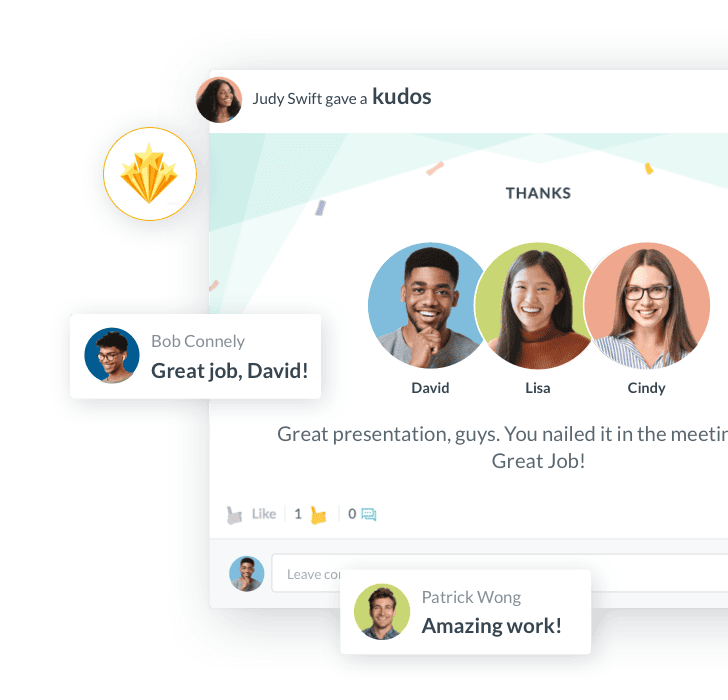Why Employee Recognition Is So Important: 9 Ways It Boosts Culture and Retention



 Cut onboarding time
by 60%—here's the
Ultimate Checklist
that helped do it.
Cut onboarding time
by 60%—here's the
Ultimate Checklist
that helped do it.

Wondering why employee recognition is so important? Here’s the straightforward answer: when people feel appreciated, they stay longer and do better work.
That’s why employee recognition is not just a nice-to-have. It’s one of the most effective, low-cost ways to shape culture, improve morale, and retain top talent. Yet, many companies still overlook it. Or treat it like an afterthought.
That’s an expensive mistake. According to Gallup, only one in three employees strongly agree they’ve been recognized for their work in the past week.
And we know what happens with the rest. They’re more likely to disengage, underperform, or leave.
In this post, we’ll break down nine powerful reasons why employee recognition matters and how it helps create a workplace where people want to stay and grow.
What Is Employee Recognition? And Why Is It So Important?
Employee recognition is the practice of acknowledging and appreciating someone’s contributions, efforts, or results at work. It can come from a manager, a peer, or even the company at large. And, it can be as simple as a thank you note or as formal as an employee reward platform.
But why does it matter so much?
Because recognition meets a basic human need: the need to feel valued. It tells employees their work is seen. That they matter. And when employees feel valued by the organization, they’re more engaged, more committed, and more likely to stay.
Recognition doubles up as a business tool that drives culture, loyalty, and performance.
Let’s dive into the nine reasons employee recognition is so important.

1. Better Recognition Builds Strong Connected Teams
Employee recognition plays a critical role in shaping workplace culture. When appreciation becomes part of daily work life and not just an annual ritual, it creates a culture where people feel safe, included, and valued.
Employees who feel recognized are more likely to feel like they belong. That sense of belonging fuels trust, collaboration, and commitment building strong teams that work well together.
2. Employee Recognition Drives Employee Engagement
Recognition isn’t just about praise but connection. It answers the unspoken question every employee carries: Does what I do here really matter?
When people know their hard work is noticed, they’re more likely to go the extra mile, contribute ideas, and stay emotionally invested in their role.
On the flip side, lack of recognition is one of the top reasons employees disengage. According to Gallup research, employees who don’t feel adequately recognized are twice as likely to quit within the year.
3. Recognition Improves Retention and Reduces Turnover
Employee recognition is one of the simplest ways to keep great people from walking out the door.
When employees feel appreciated, they’re less likely to burn out or look elsewhere. Recognition reinforces that they’re on the right path, and that their work is valued not just by their manager, but by the company as a whole.
Recognizing employees is important during critical phases like onboarding, performance reviews, or after major projects. Because these are the moments that shape how people feel about staying long-term.
In a competitive talent market, retention isn’t just about salary. It’s about feeling respected. And recognition goes a long way in making that happen.
4. Employee Recognition Increases Productivity and Motivation
One of the advantages of employee recognition is a measurable boost in motivation and output. Clearly, when people know their efforts won’t go unnoticed, they put in more effort consistently.
Recognition creates a positive feedback loop. The more employees feel acknowledged, the more invested they become in their work. That leads to higher-quality outcomes, better customer service, and faster turnaround times.
A simple thank-you or shoutout can spark the kind of energy that no policy or process can replicate.
5. Recognition Strengthens Team Morale and Collaboration
Team success depends on trust and trust grows when appreciation is apparent.
Recognizing employees shapes how teams communicate and collaborate. When employees feel valued by their peers, not just their managers, they are quicker to support each other and work towards a shared goal. The team morale also goes up and silos start to come down.
Because recognizing employees regularly isn't just about rewarding effort. It’s about reinforcing a collective mindset: We’re in this together.
6. Recognition Enhances Manager-Employee Relationships
Recognition is a key part of effective leadership. It builds trust, improves communication, and strengthens the connection between managers and their teams.
When employees feel valued by their manager, they’re more likely to speak up, take initiative, and stay engaged. It creates a foundation where feedback flows both ways not just during reviews but in everyday interactions.
A genuine moment of appreciation from a manager can do more to build loyalty than any policy or perk.
7. Recognition Creates a Ripple Effect Across the Organization
Recognition doesn’t stay in one department or team. It spreads.
When employees see their peers being appreciated, it sets a standard. It encourages others to notice effort, give feedback, and express gratitude. Over time, this ripple effect creates a workplace where appreciation becomes the norm, not the exception.
This is why employee appreciation is important at every level. It shapes how people treat each other. It impacts how new hires feel during onboarding and how long-time employees stay motivated through change.
The more consistent and visible the recognition, the stronger the workplace culture becomes.

8. Reinforces Values That Attract and Keep the Right Talent
Recognition helps you do more than retain people. It helps you attract the right ones.
How?
When you consistently recognize employees for behaviors that reflect your company values, you create a live example of what your culture rewards. This becomes a magnet for candidates who align with those same values and a filter for those who don’t.
9. Supports Mental Well-Being and Reduces Burnout
Recognition is also a powerful tool for mental well-being.
When employees feel invisible or unappreciated, stress builds. Over time, that leads to burnout, disengagement, and absenteeism.
Why?
Because humans need emotional validation and support to help them to push through challenges without feeling alone or undervalued.
And consistent recognition achieves exactly that. It reminds people that they and their work matters, especially during high-pressure periods.

Recognition is a Culture Strategy That Pays Off
Employee recognition shapes how people feel, how they perform, and whether they stay.
You can’t build a strong workplace without it. And you shouldn’t wait for performance reviews or annual awards to start. Recognition belongs in the everyday. Woven into how you lead, communicate, and grow your team.
The best part?
It doesn’t take much to create impact. A simple thank-you. A shoutout tied to your values. A moment of acknowledgment that says you matter.
Ready to make recognition part of your culture?
Let’s explore what that could look like for your team.
FAQs
Why should we recognize employees?
Recognition tells employees their work matters. It reinforces positive behaviors, builds trust, and encourages a stronger connection to the team and organization.
What are the benefits of recognizing employees?
Recognition improves morale, productivity, and collaboration. It also helps reduce turnover by creating a culture where people feel seen and valued.
Why is it important for employees to feel valued?
Feeling valued boosts confidence, motivation, and job satisfaction. It’s key to building emotional commitment and long-term loyalty to the company.
How important is employee recognition in the workplace?
Recognition is essential for creating a healthy workplace culture. It signals respect, strengthens relationships, and improves how teams perform under pressure.
Why do employees need recognition?
Employees need recognition to stay motivated and engaged. It gives them feedback, builds confidence, and helps them see how their work fits into the bigger picture.
Why is employee appreciation important for leadership?
When leaders show appreciation, it builds trust and credibility. It also sets the tone for how the rest of the organization values and supports its people.
How can recognition improve company culture?
Recognition reinforces the behaviors and values you want to see more of. Over time, it creates a culture of appreciation, collaboration, and high performance.
This article is written by Shweta in close association with HR Cloud. HR Cloud is a leading provider of proven HR solutions, including recruiting, onboarding, employee communications & engagement, and rewards & recognition. Our user-friendly software increases employee productivity, delivers time and cost savings, and minimizes compliance risk.
Keep Reading
25 Employee Incentive Programs to Boost Engagement and Retention
What are employee incentive programs? Employee incentive programs are structured systems
100 Icebreaker Questions for Work That Build Lasting Team Connections
Strong teams don't emerge from org charts—they're built through authentic human
Company Core Values Examples: 25 Inspiring Ways to Build Culture Through Recognition
Company core values shape every interaction in your workplace - from how decisions get
Like What You Hear?
We'd love to chat with you more about how HR Cloud® can support your business's HR needs. Book Your Free Demo

Build a Culture of Recognition. Boost Engagement. Guaranteed.
Workmates empowers employees to stay informed, connected, and appreciated—whether they’re on the front line, in the office, or remote. Recognition drives 12x higher engagement.Trusted by industry leaders in every sector




Cut Onboarding Costs by 60%.
Take the confusion and follow-ups out of onboarding with automated workflows, digital forms, and structured portals—so new hires ramp faster 3X quicker.Trusted by industry leaders in every sector




